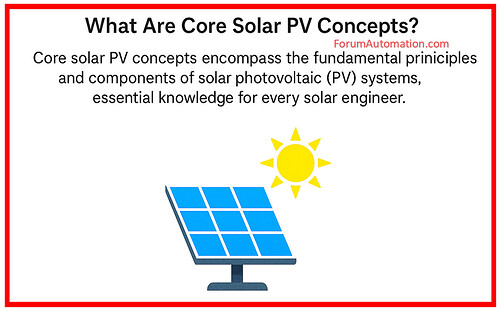Understanding the fundamental ideas of Photovoltaic (PV) systems is essential for being a successful solar engineer. These key fundamental contribute to the design, installation, operation, & troubleshooting of the solar power systems.
Essential Solar PV Concepts for Engineers
What is the photovoltaic effect?
Solar cells turn sunlight directly into electricity utilizing semiconductor materials such as silicon.
What are the key components of a solar PV system?
Solar panels: Solar panels (modules) convert sunlight into DC power.
Inverter: Converts DC to AC.
Mounting Structure: Supports the panels.
Charge Controller (off-grid): regulates battery charge.
Battery Bank (in hybrid/off-grid): stores energy.
Protection: DC/AC disconnects, fuses, and MCBs are used to protect and isolate.
What is solar irradiation and how it impacts output?
Solar irradiance refers to the amount of solar radiation per unit area (W/m²). Higher irradiance results in greater power output from the PV panels.
What is the distinction between KWp & kWh?
kWp: Maximum power capacity of a system
kWh: The actual energy produced (or) consumed over time.
How are solar panels connected: series or parallel?
Series: Voltage adds up, but current remains constant.
Parallel: Current adds up, but voltage remains constant
Used to match the inverter input requirements.
What is Maximum Power Point Tracking (MPPT)?
MPPT is an algorithm used in inverters (or) charge controllers to ensure that panels perform at their peak efficiency under fluctuating solar conditions.
What are the varieties of solar PV systems?
- Grid-tied
- Off-grid
- Hybrid
How is solar system efficiency measured?
Efficiency = (Output Power / Input Solar Power) x 100.
Temperature, dust & panel orientation all have an impact on this.
What are standard test conditions (STC) for panels?
1000 W/m² irradiance.
Cell temperature: 25°C
Air Mass: 1.5
Why is the panel tilt angle important?
Depending on the geographic region, correct tilt optimizes sunshine exposure and energy generation.
You can also follow us on AutomationForum.co, Facebook and Linkedin to receive daily Instrumentation updates.
You can also follow us on ForumElectrical.com , Facebook and Linkedin to receive daily Electrical updates.
